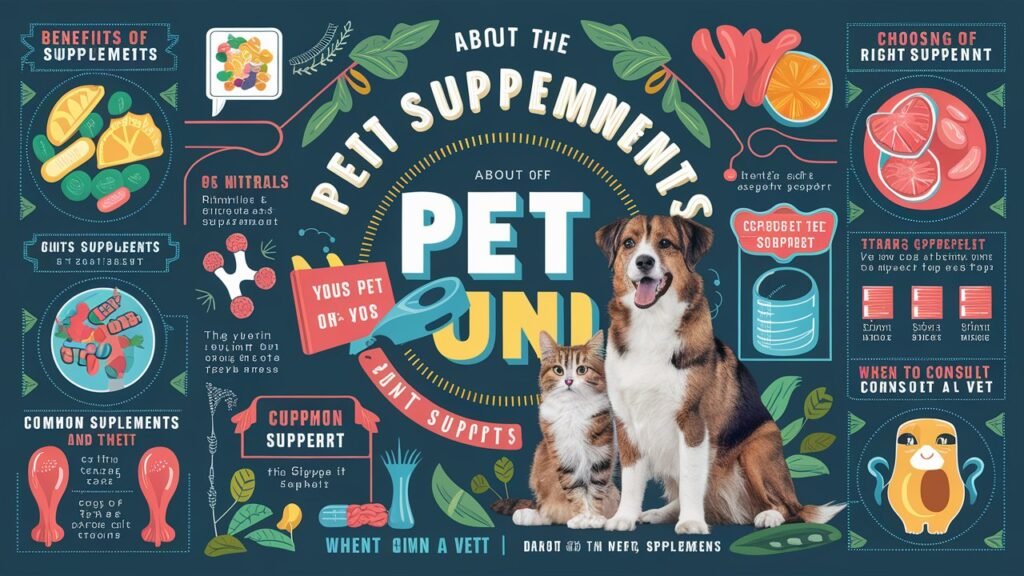Pets hold a special place in our hearts, and as pet owners, ensuring their health and well-being is paramount. Just like humans, pets require a balanced diet to thrive, but with modern dietary trends and lifestyle factors, meeting all their nutritional needs can be challenging. This is where supplements come into play. In this comprehensive guide, GlobalPawParadise explores the vital role of supplements in your pet’s diet, providing essential insights to help you make informed decisions about their nutrition.
Why Supplements Matter
In an ideal world, our pets would obtain all the nutrients they need from their diet alone. However, factors such as processed pet foods, nutrient-depleted soils, and individual health conditions can lead to nutritional gaps. Supplements bridge these gaps by providing concentrated sources of essential vitamins, minerals, fatty acids, probiotics, and herbal extracts. By incorporating supplements into your pet’s routine, you can support their overall health and address specific concerns such as joint mobility, skin and coat health, and digestive function.
Types of Supplements
When it comes to supplements for pets, the options abound. From multivitamins to omega-3 fatty acids and everything in between, each type of supplement plays a unique role in supporting your pet’s health. Vitamins like A, D, and E are crucial for immune function and cell growth, while minerals such as calcium and phosphorus are essential for bone health. Fatty acids like omega-3s promote a healthy coat and reduce inflammation, while probiotics support gut health and digestion. Herbal supplements offer natural remedies for various health issues, from anxiety to allergies.
Common Deficiencies in Pets
Despite our best efforts, pets can still experience nutritional deficiencies that impact their well-being. Common deficiencies include those in vitamins D, B12, and E, as well as minerals like calcium and iron. Symptoms of these deficiencies may manifest as lethargy, poor coat condition, digestive issues, and weakened immunity. Addressing these deficiencies promptly through targeted supplementation can help alleviate symptoms and improve your pet’s quality of life.
Choosing the Right Supplements
With countless supplements lining the shelves, choosing the right ones for your pet can feel overwhelming. Factors such as age, breed, size, and existing health conditions should all be taken into account when selecting supplements. Consulting with a veterinarian is crucial for personalized recommendations tailored to your pet’s specific needs. Additionally, opt for supplements from reputable brands that undergo rigorous testing for safety and efficacy.
Safety Considerations
While supplements can offer numerous benefits, it’s essential to use them responsibly. Over-supplementation can lead to nutrient imbalances and adverse effects on your pet’s health. Always follow dosage guidelines provided by the manufacturer or your veterinarian, and monitor your pet for any signs of intolerance or toxicity. Keep supplements out of reach of pets, as some formulations may be harmful if ingested in large quantities.
Incorporating Supplements Into Your Pet’s Diet
Introducing supplements into your pet’s routine can be a seamless process with the right approach. Start gradually and monitor your pet’s response to each supplement. Some supplements may be administered directly, while others can be mixed into food or treats for easy consumption. Consistency is key, so establish a regular schedule for administering supplements and track their effects over time.
The Importance of Nutritional Balance
While supplements can play a valuable role in supporting your pet’s health, they should never replace a balanced diet. Nutritional balance is key to ensuring your pet receives all the essential nutrients they need to thrive. In addition to supplements, focus on providing a high-quality diet tailored to your pet’s nutritional requirements. Regular exercise and veterinary check-ups further contribute to their overall well-being.
Conclusion
Understanding the role of supplements in your pet’s diet is essential for providing them with the best possible care. By filling nutritional gaps and addressing specific health concerns, supplements can enhance your pet’s quality of life and longevity. However, it’s crucial to approach supplementation with caution and seek guidance from a veterinarian when necessary. With proper knowledge and informed decision-making, you can ensure that your furry friend receives the nutritional support they need to live a happy and healthy life.
FAQ for Understanding The Role Of Supplements In Your Pet’s Diet
- Does my pet need dietary supplements?
Not all pets need supplements; consult your vet based on age, health, and diet. - What are the common supplements for pets?
Omega-3 fatty acids, glucosamine, probiotics, and vitamins are commonly recommended. - Can supplements replace a balanced diet?
No, supplements should complement a diet, not substitute it. - How do I ensure a supplement is safe?
Choose vet-recommended brands with clear labeling and avoid human supplements. - Can supplements help with specific conditions?
Yes, certain supplements support joint health, coat condition, or digestive issues in pets.

